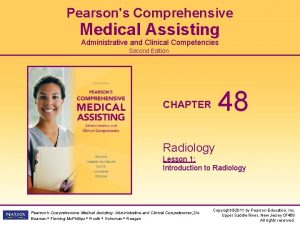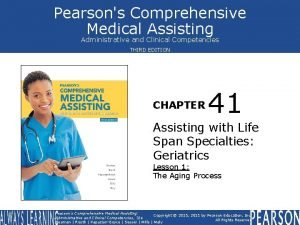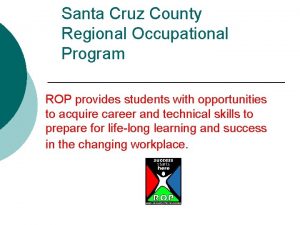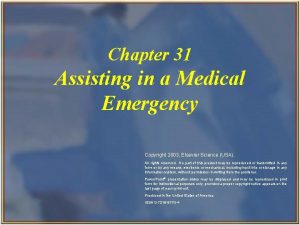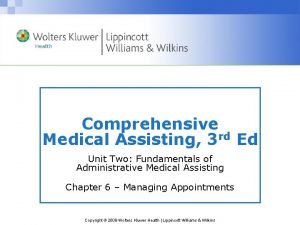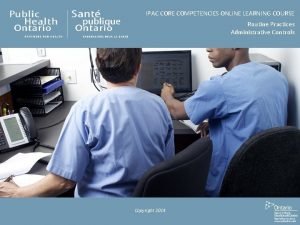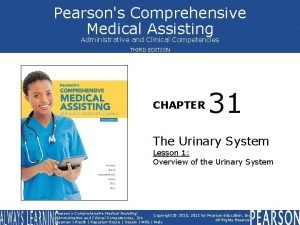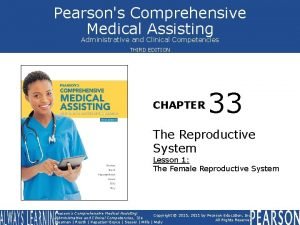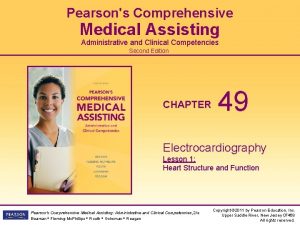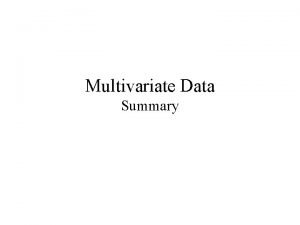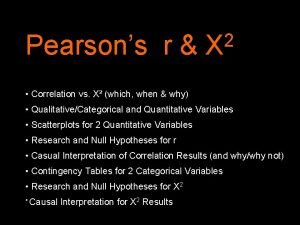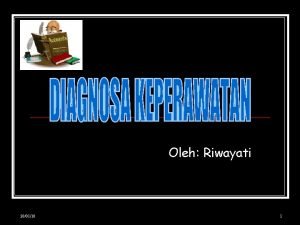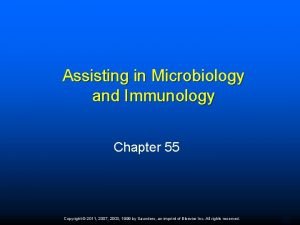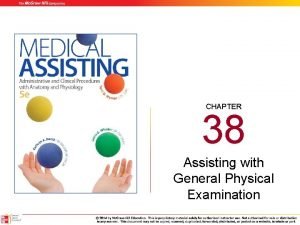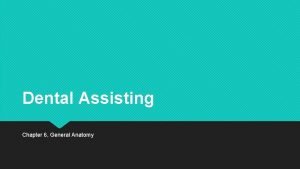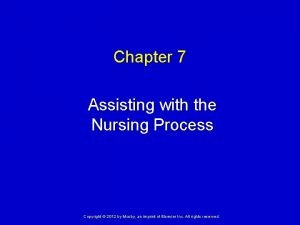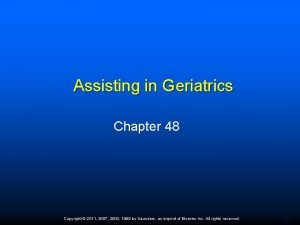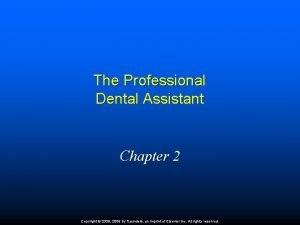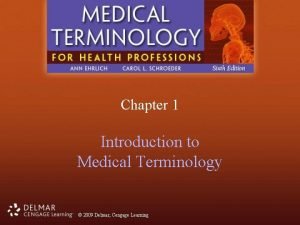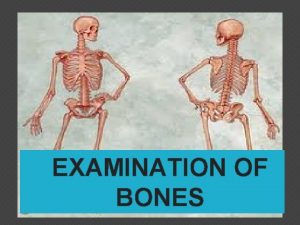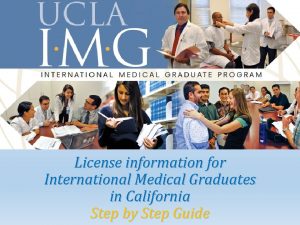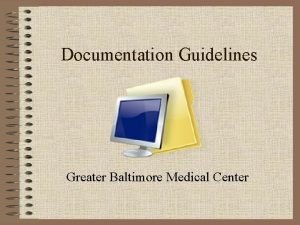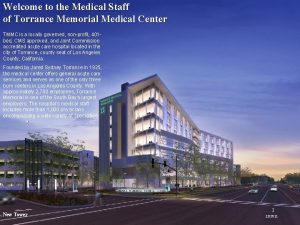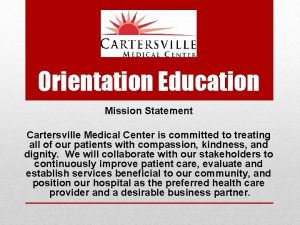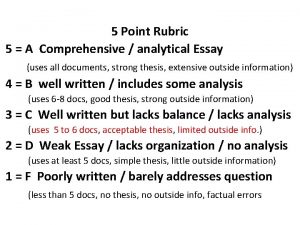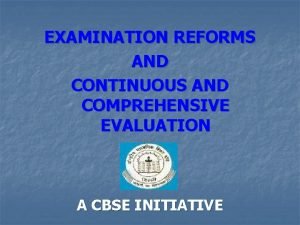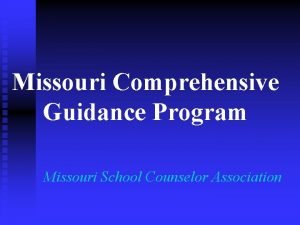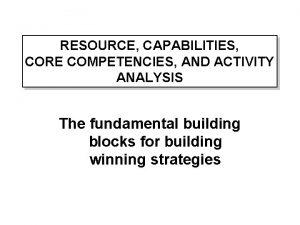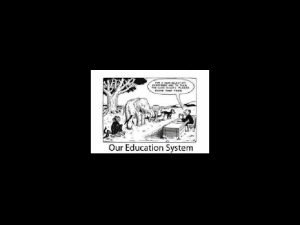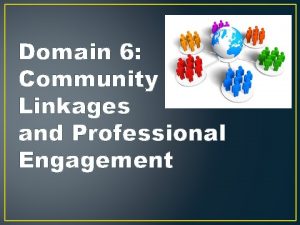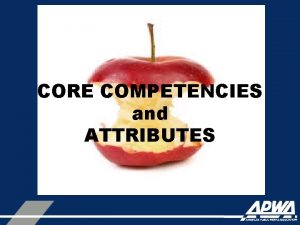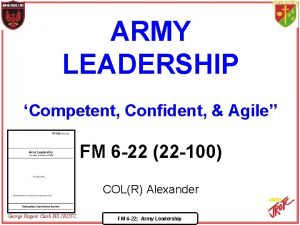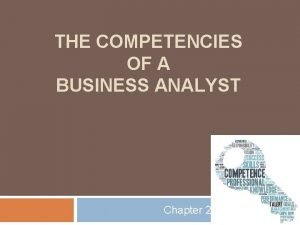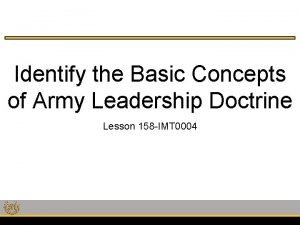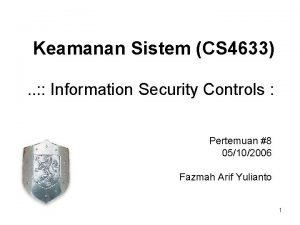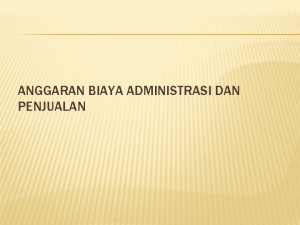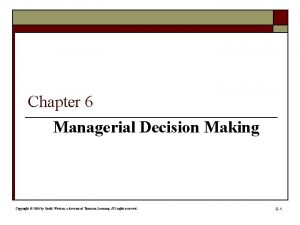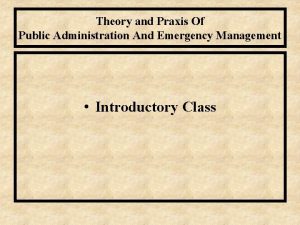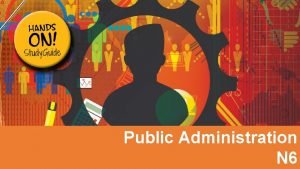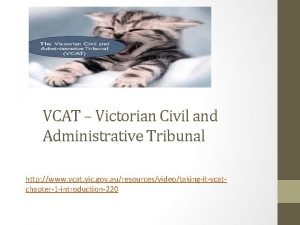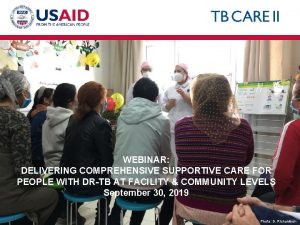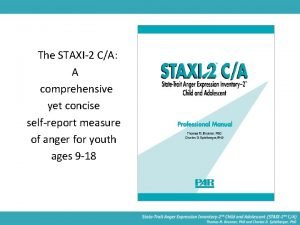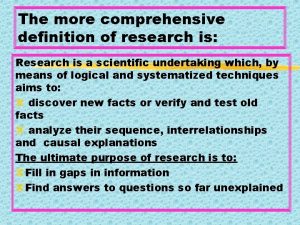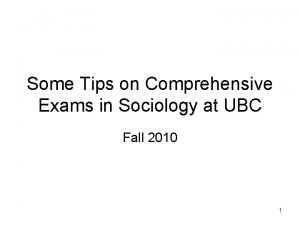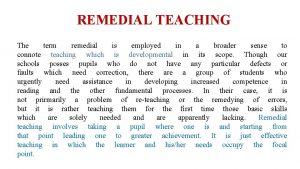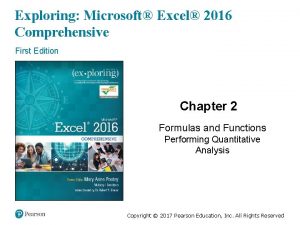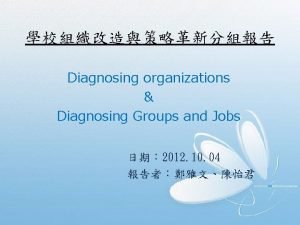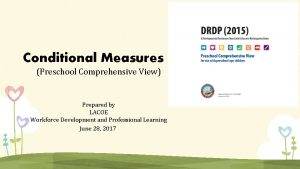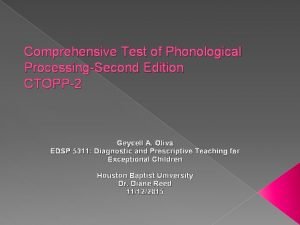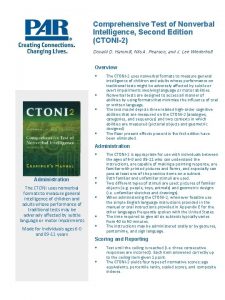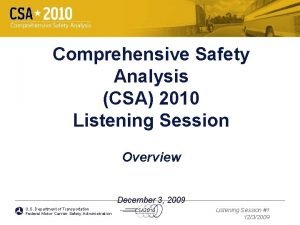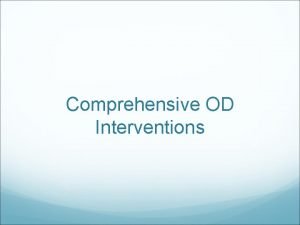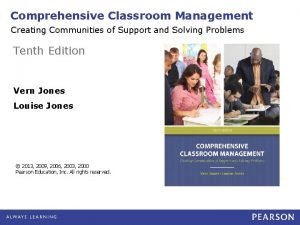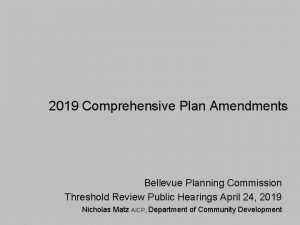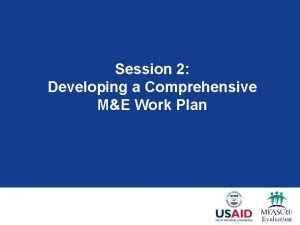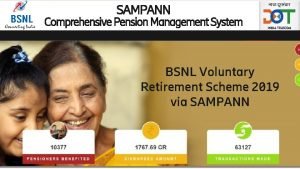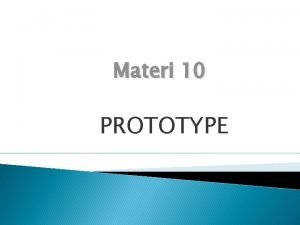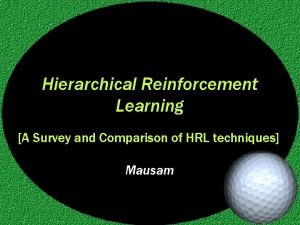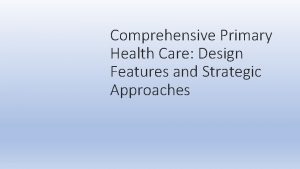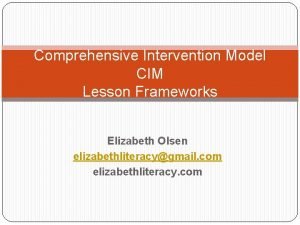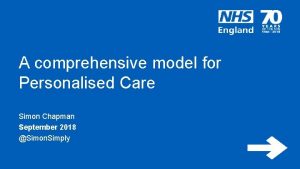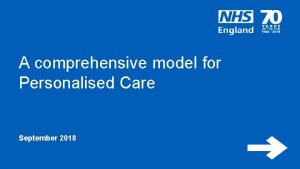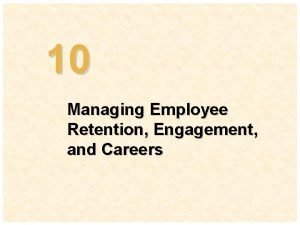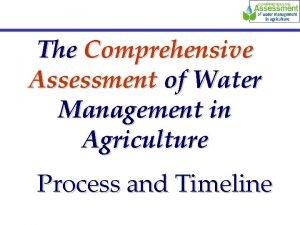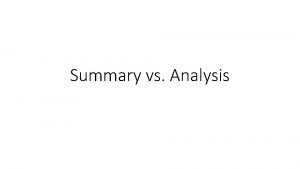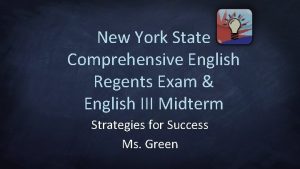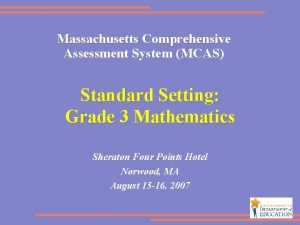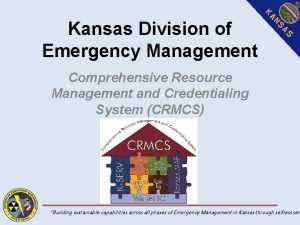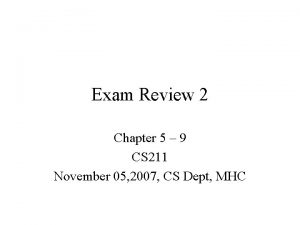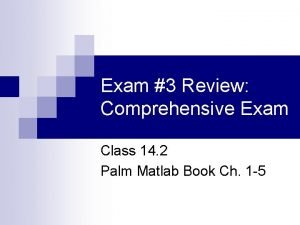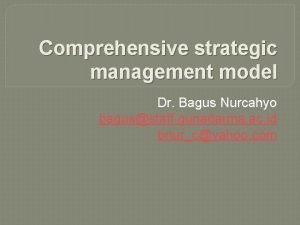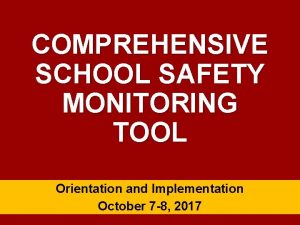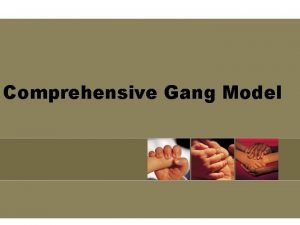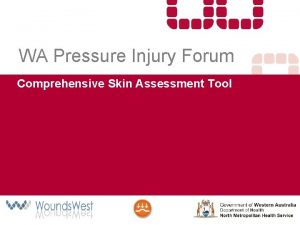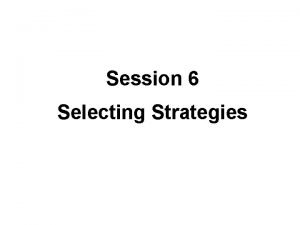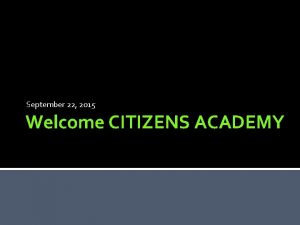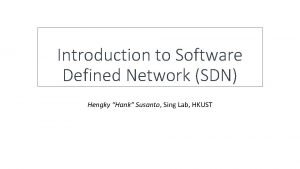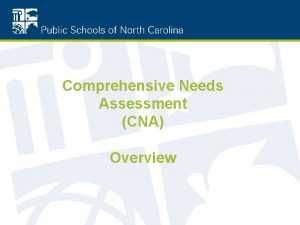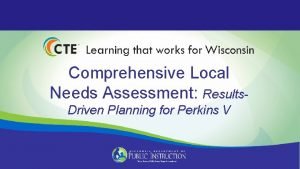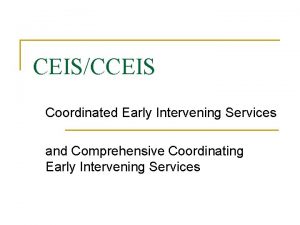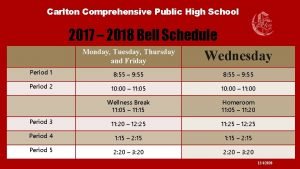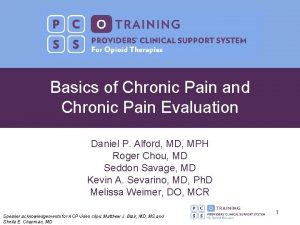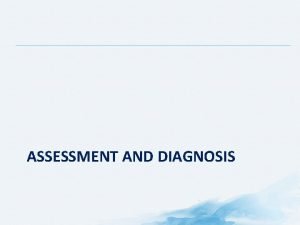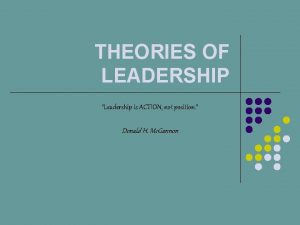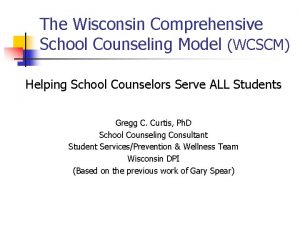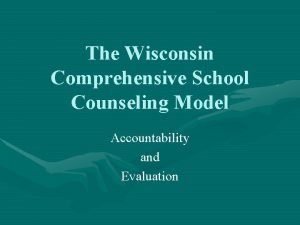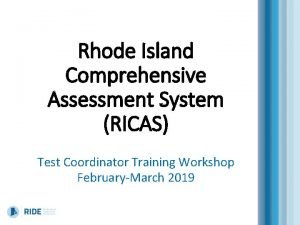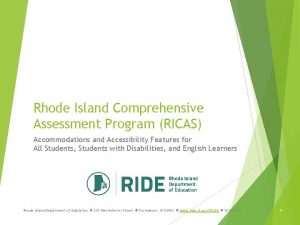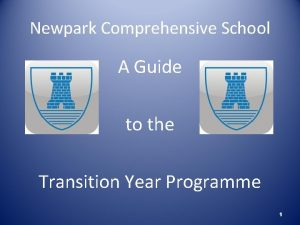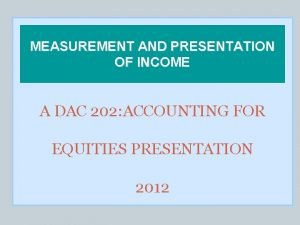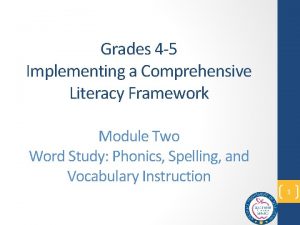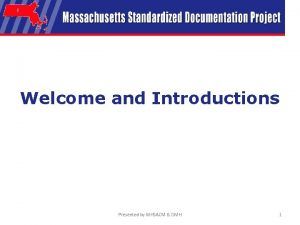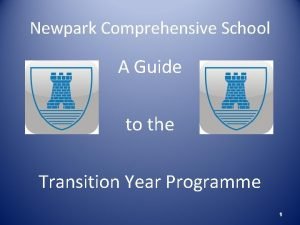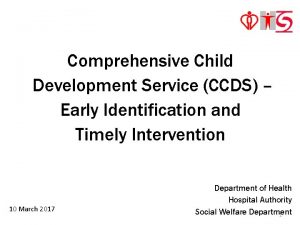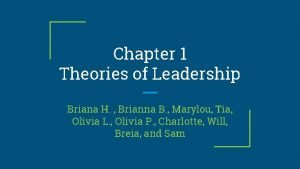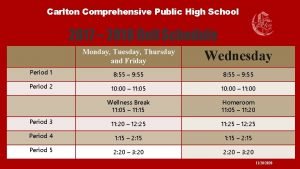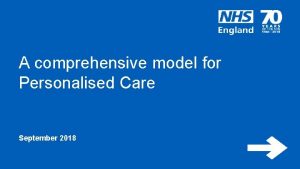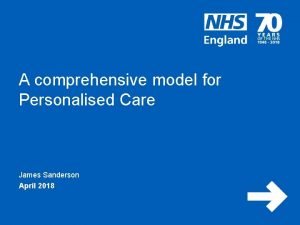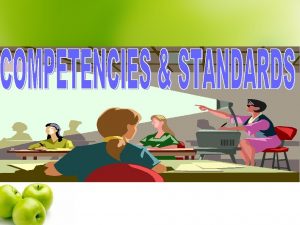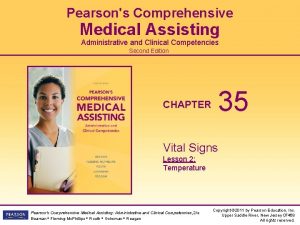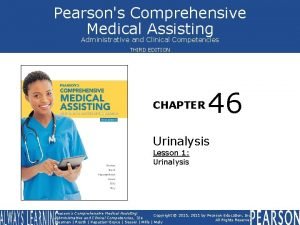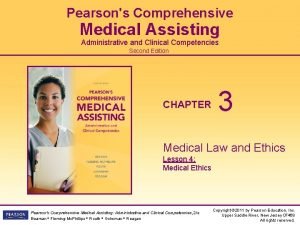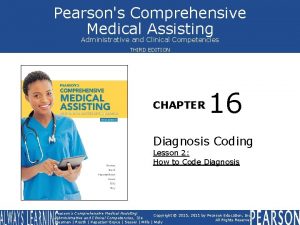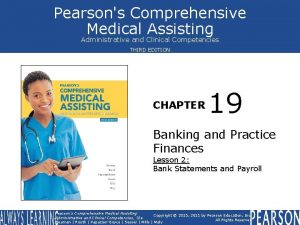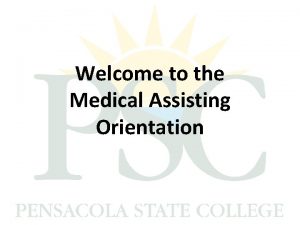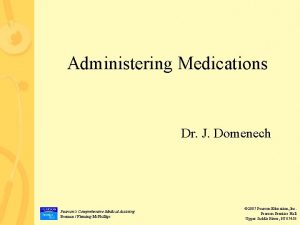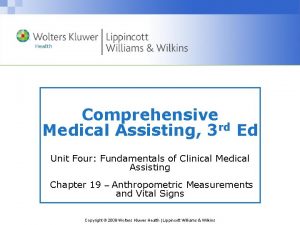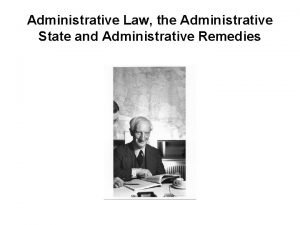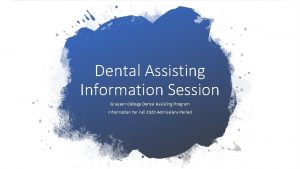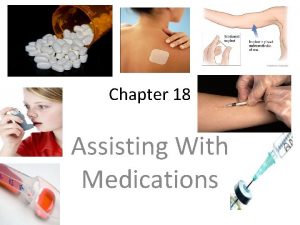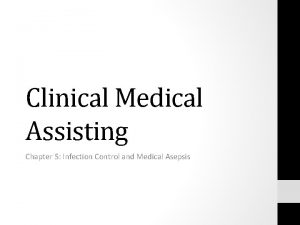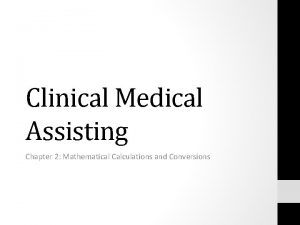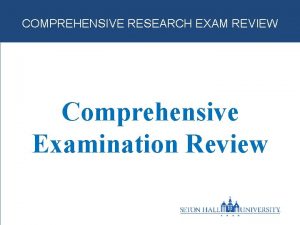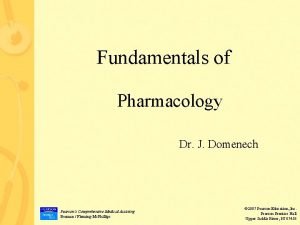Pearsons Comprehensive Medical Assisting Administrative and Clinical Competencies












































































































































- Slides: 140

Pearson's Comprehensive Medical Assisting Administrative and Clinical Competencies THIRD EDITION CHAPTER 41 Assisting with Life Span Specialties: Geriatrics Lesson 1: The Aging Process Pearson's Comprehensive Medical Assisting: Copyright © 2015, 2011 by Pearson Education, Inc. Administrative and Clinical Competencies, 3/e All Rights Reserved Beaman | Routh | Papazian-Boyce | Sesser | Mills | Maly

Lesson Objectives Upon completion of this lesson, students should be able to: 1. Define and spell the terms to learn in the chapter. 2. Explain the impact of an aging population on health care in the United States. 3. Describe the aging process and its effects on each system of the body. Pearson's Comprehensive Medical Assisting: Copyright © 2015, 2011 by Pearson Education, Inc. Administrative and Clinical Competencies, 3/e All Rights Reserved Beaman | Routh | Papazian-Boyce | Sesser | Mills | Maly

Lesson Objectives Upon completion of this lesson, students should be able to: 4. Compare and contrast confusion, depression, and dementia in the elderly. 5. Summarize guidelines for effective communication with the elderly. Pearson's Comprehensive Medical Assisting: Copyright © 2015, 2011 by Pearson Education, Inc. Administrative and Clinical Competencies, 3/e All Rights Reserved Beaman | Routh | Papazian-Boyce | Sesser | Mills | Maly

Lesson Objectives Upon completion of this lesson, students should be able to: 6. Identify legal issues of aging patients. 7. Identify six safety measures to recommend to caregivers of aging patients. Pearson's Comprehensive Medical Assisting: Copyright © 2015, 2011 by Pearson Education, Inc. Administrative and Clinical Competencies, 3/e All Rights Reserved Beaman | Routh | Papazian-Boyce | Sesser | Mills | Maly

Treatment of Elderly Patients • Geriatrics § The field of medicine specializing in the treatment of elderly patients § Term derived from the Greek word "geras" (old age) and from the word "iatrikos" (physician) • Gerontology § The study of the process of aging and the effects of aging on people Pearson's Comprehensive Medical Assisting: Copyright © 2015, 2011 by Pearson Education, Inc. Administrative and Clinical Competencies, 3/e All Rights Reserved Beaman | Routh | Papazian-Boyce | Sesser | Mills | Maly

Treatment of Elderly Patients • Geriatrician § Physician who diagnoses and treats conditions that mainly affect older people: • • • Osteoarthritis Congestive heart failure Arthritis Emphysema Stroke Alzheimer's disease Pearson's Comprehensive Medical Assisting: Copyright © 2015, 2011 by Pearson Education, Inc. Administrative and Clinical Competencies, 3/e All Rights Reserved Beaman | Routh | Papazian-Boyce | Sesser | Mills | Maly

The Medical Assistant's Role in Geriatrics • MAs may work in a specialty office that provides services specifically to the elderly population or in a general practice that treats patients of any age. • Elderly have fewer acute illnesses than younger age groups • When elderly become acutely ill, recovery period is typically longer Pearson's Comprehensive Medical Assisting: Copyright © 2015, 2011 by Pearson Education, Inc. Administrative and Clinical Competencies, 3/e All Rights Reserved Beaman | Routh | Papazian-Boyce | Sesser | Mills | Maly

The Medical Assistant's Role in Geriatrics • Chronic illness is the major problem for the older population. • Elderly take more prescription and OTC medications than younger populations Pearson's Comprehensive Medical Assisting: Copyright © 2015, 2011 by Pearson Education, Inc. Administrative and Clinical Competencies, 3/e All Rights Reserved Beaman | Routh | Papazian-Boyce | Sesser | Mills | Maly

The Medical Assistant's Role in Geriatrics • MA is responsible for reviewing medication list and verifying dosages and strengths • MA must support physical and emotional needs of elderly patients in their care Pearson's Comprehensive Medical Assisting: Copyright © 2015, 2011 by Pearson Education, Inc. Administrative and Clinical Competencies, 3/e All Rights Reserved Beaman | Routh | Papazian-Boyce | Sesser | Mills | Maly

The Medical Assistant's Role in Geriatrics • Elderly patients have decreased mobility, instability, or other physical problems; therefore, they may need additional assistance. • Older people vary widely in physical and mental health. Pearson's Comprehensive Medical Assisting: Copyright © 2015, 2011 by Pearson Education, Inc. Administrative and Clinical Competencies, 3/e All Rights Reserved Beaman | Routh | Papazian-Boyce | Sesser | Mills | Maly

The Medical Assistant's Role in Geriatrics • Effective Communication § § Do not be hurried. Speak clearly and slowly. Make eye contact. Avoid pet names. Pearson's Comprehensive Medical Assisting: Copyright © 2015, 2011 by Pearson Education, Inc. Administrative and Clinical Competencies, 3/e All Rights Reserved Beaman | Routh | Papazian-Boyce | Sesser | Mills | Maly

Communicating Effectively with the Elderly 1. When entering the reception area to call the patient back to the examination area, have a cheerful disposition and welcoming smile on your face. Pearson's Comprehensive Medical Assisting: Copyright © 2015, 2011 by Pearson Education, Inc. Administrative and Clinical Competencies, 3/e All Rights Reserved Beaman | Routh | Papazian-Boyce | Sesser | Mills | Maly

Communicating Effectively with the Elderly 2. Different offices may have different policies about how to address patients, whether by their first or last name. Follow the policy of your practice. 3. Introduce yourself. Be sincere and polite. From this point on, when addressing the patient, use a title, such as "Mr. , " "Mrs. " or "Miss. " Pearson's Comprehensive Medical Assisting: Copyright © 2015, 2011 by Pearson Education, Inc. Administrative and Clinical Competencies, 3/e All Rights Reserved Beaman | Routh | Papazian-Boyce | Sesser | Mills | Maly

Communicating Effectively with the Elderly 4. Escort the patient to the examination room. If the patient is using a walker or a cane, walk closely to the patient and offer assistance if it seems to be needed. Pearson's Comprehensive Medical Assisting: Copyright © 2015, 2011 by Pearson Education, Inc. Administrative and Clinical Competencies, 3/e All Rights Reserved Beaman | Routh | Papazian-Boyce | Sesser | Mills | Maly

PROCEDURE 41 -1 Communicating Effectively with the Elderly FIGURE A The medical assistant should provide assistance while promoting independence in patients. Pearson's Comprehensive Medical Assisting: Copyright © 2015, 2011 by Pearson Education, Inc. Administrative and Clinical Competencies, 3/e All Rights Reserved Beaman | Routh | Papazian-Boyce | Sesser | Mills | Maly

Communicating Effectively with the Elderly 5. Build rapport with the patient by making small talk while walking in the hallway or preparing items in the examination room. The tone of your voice must be sincere, not indicating that conversation is forced. Pearson's Comprehensive Medical Assisting: Copyright © 2015, 2011 by Pearson Education, Inc. Administrative and Clinical Competencies, 3/e All Rights Reserved Beaman | Routh | Papazian-Boyce | Sesser | Mills | Maly

Communicating Effectively with the Elderly 6. Explain that you will be preparing the patient to see the doctor for a physical examination or whatever today's procedure may be. Let the patient know what will be done and if anything will be expected of him or her during the appointment. Pearson's Comprehensive Medical Assisting: Copyright © 2015, 2011 by Pearson Education, Inc. Administrative and Clinical Competencies, 3/e All Rights Reserved Beaman | Routh | Papazian-Boyce | Sesser | Mills | Maly

Communicating Effectively with the Elderly 7. Observe the patient for cues to indicate whether your remarks have or have not been understood. If it appears that the patient does not comprehend, paraphrase, using other words and simple gestures. Pearson's Comprehensive Medical Assisting: Copyright © 2015, 2011 by Pearson Education, Inc. Administrative and Clinical Competencies, 3/e All Rights Reserved Beaman | Routh | Papazian-Boyce | Sesser | Mills | Maly

Communicating Effectively with the Elderly 8. Allow enough time for the patient to process information and ask if he or she has any questions before continuing. 9. Observe the patient's overall physical ability to comply with your requests as you progress with preparing the patient for the examination or procedure. Pearson's Comprehensive Medical Assisting: Copyright © 2015, 2011 by Pearson Education, Inc. Administrative and Clinical Competencies, 3/e All Rights Reserved Beaman | Routh | Papazian-Boyce | Sesser | Mills | Maly

Communicating Effectively with the Elderly 10. Offer physical assistance if it appears the patient needs it. Allow the patient to do as much for him or herself as possible so as not to undermine his or her independence. Pearson's Comprehensive Medical Assisting: Copyright © 2015, 2011 by Pearson Education, Inc. Administrative and Clinical Competencies, 3/e All Rights Reserved Beaman | Routh | Papazian-Boyce | Sesser | Mills | Maly

Communicating Effectively with the Elderly 11. Ask the patient to be seated while you begin to gather information for the patient history. If you think the patient would be unsteady sitting on the examination table for an extended period of time, allow the patient to answer questions while seated in a chair in the examination room. Pearson's Comprehensive Medical Assisting: Copyright © 2015, 2011 by Pearson Education, Inc. Administrative and Clinical Competencies, 3/e All Rights Reserved Beaman | Routh | Papazian-Boyce | Sesser | Mills | Maly

Communicating Effectively with the Elderly 12. Speak respectfully, and convey a feeling of warmth and empathy. If the patient's replies to questions become too lengthy, gently interrupt and bring the patient back to the subject. Pearson's Comprehensive Medical Assisting: Copyright © 2015, 2011 by Pearson Education, Inc. Administrative and Clinical Competencies, 3/e All Rights Reserved Beaman | Routh | Papazian-Boyce | Sesser | Mills | Maly

Communicating Effectively with the Elderly 13. If answers to some of your questions seem incorrect or inappropriate, do not correct the patient. Gently distract the patient with another topic and proceed with your examination preparations. Pearson's Comprehensive Medical Assisting: Copyright © 2015, 2011 by Pearson Education, Inc. Administrative and Clinical Competencies, 3/e All Rights Reserved Beaman | Routh | Papazian-Boyce | Sesser | Mills | Maly

Communicating Effectively with the Elderly 14. If the patient exhibits mental confusion in regard to some of your questions, do not press the patient for immediate answers. Inform the physician and make note of questions that need clearer answers. A caregiver or family member may be able to help with these answers at a later time. Pearson's Comprehensive Medical Assisting: Copyright © 2015, 2011 by Pearson Education, Inc. Administrative and Clinical Competencies, 3/e All Rights Reserved Beaman | Routh | Papazian-Boyce | Sesser | Mills | Maly

Communicating Effectively with the Elderly 15. Do not leave the patient unattended if he or she is physically unstable or appears confused. Remember that relaxed body language, pleasant facial expressions, and a caring touch are most important in caring for patients who are confused. Pearson's Comprehensive Medical Assisting: Copyright © 2015, 2011 by Pearson Education, Inc. Administrative and Clinical Competencies, 3/e All Rights Reserved Beaman | Routh | Papazian-Boyce | Sesser | Mills | Maly

Communicating Effectively with the Elderly 16. Document information appropriately within the patient's medical record. Keep in mind that opinions are never to be included, only objective information, facts that you are able to observe. Pearson's Comprehensive Medical Assisting: Copyright © 2015, 2011 by Pearson Education, Inc. Administrative and Clinical Competencies, 3/e All Rights Reserved Beaman | Routh | Papazian-Boyce | Sesser | Mills | Maly

The Aging Population • Social Security Administration founded under President Franklin D. Roosevelt in 1935 § Retirement benefits to senior citizens who have paid into Social security system during their working years Pearson's Comprehensive Medical Assisting: Copyright © 2015, 2011 by Pearson Education, Inc. Administrative and Clinical Competencies, 3/e All Rights Reserved Beaman | Routh | Papazian-Boyce | Sesser | Mills | Maly

The Aging Population • In 1965, the federal government enacted the following: § Administration on Aging and Older Americans Act - the Administration on Aging became a part of the United States Department of Health § Medicare – a medical insurance system to meet the needs of Americans aged 65 and older as well as others with special health conditions Pearson's Comprehensive Medical Assisting: Copyright © 2015, 2011 by Pearson Education, Inc. Administrative and Clinical Competencies, 3/e All Rights Reserved Beaman | Routh | Papazian-Boyce | Sesser | Mills | Maly

The Aging Population • Medicaid § A medical insurance program for lowincome individuals, administered by state governments § Retired and elderly adults living on small fixed incomes may qualify for both Medicare and Medicaid. Pearson's Comprehensive Medical Assisting: Copyright © 2015, 2011 by Pearson Education, Inc. Administrative and Clinical Competencies, 3/e All Rights Reserved Beaman | Routh | Papazian-Boyce | Sesser | Mills | Maly

The Aging Population • Medicaid § Medigap insurance • A supplement to Medicare to offset the percentage of health care costs that Medicare does not cover Pearson's Comprehensive Medical Assisting: Copyright © 2015, 2011 by Pearson Education, Inc. Administrative and Clinical Competencies, 3/e All Rights Reserved Beaman | Routh | Papazian-Boyce | Sesser | Mills | Maly

Life Expectancy • Estimated that those age 65 and over will make up 20 % of the population by 2050 • Life expectancy increasing due to better living conditions, medical advances, better nutrition, and new medications Pearson's Comprehensive Medical Assisting: Copyright © 2015, 2011 by Pearson Education, Inc. Administrative and Clinical Competencies, 3/e All Rights Reserved Beaman | Routh | Papazian-Boyce | Sesser | Mills | Maly

Life Expectancy • Elderly are living longer in good health • Long-term demands on beneficial programs will increase. • Number of long-term residents in care facilities has declined as in-home health care service options have expanded Pearson's Comprehensive Medical Assisting: Copyright © 2015, 2011 by Pearson Education, Inc. Administrative and Clinical Competencies, 3/e All Rights Reserved Beaman | Routh | Papazian-Boyce | Sesser | Mills | Maly

Life Expectancy • The Baby Boomer Generation § Watched closely for trends § Born between 1946 and 1964 § Oldest baby boomers became senior citizens in 2011 Pearson's Comprehensive Medical Assisting: Copyright © 2015, 2011 by Pearson Education, Inc. Administrative and Clinical Competencies, 3/e All Rights Reserved Beaman | Routh | Papazian-Boyce | Sesser | Mills | Maly

Life Expectancy • The Baby Boomer Generation § By 2029, all surviving baby boomers will be senior citizens. § Tended to have fewer children than previous generations or waited later to have children Pearson's Comprehensive Medical Assisting: Copyright © 2015, 2011 by Pearson Education, Inc. Administrative and Clinical Competencies, 3/e All Rights Reserved Beaman | Routh | Papazian-Boyce | Sesser | Mills | Maly

Life Expectancy • The Baby Boomer Generation § Those without financial safety net of grown children will receive less assistance from family as they age § Often called the "sandwich generation" as many are caring for an ailing parent and a young child at the same time Pearson's Comprehensive Medical Assisting: Copyright © 2015, 2011 by Pearson Education, Inc. Administrative and Clinical Competencies, 3/e All Rights Reserved Beaman | Routh | Papazian-Boyce | Sesser | Mills | Maly

Life Expectancy • The Baby Boomer Generation § MA must be aware of an older patient's life circumstances because they can impact the way health care decisions are made Pearson's Comprehensive Medical Assisting: Copyright © 2015, 2011 by Pearson Education, Inc. Administrative and Clinical Competencies, 3/e All Rights Reserved Beaman | Routh | Papazian-Boyce | Sesser | Mills | Maly

Life Expectancy • The Baby Boomer Generation § World War II generation considered the best-educated generational group due to G. I. Bill § Studies show large inequality in education and financial stability among Boomers Pearson's Comprehensive Medical Assisting: Copyright © 2015, 2011 by Pearson Education, Inc. Administrative and Clinical Competencies, 3/e All Rights Reserved Beaman | Routh | Papazian-Boyce | Sesser | Mills | Maly

Life Expectancy • The Baby Boomer Generation § Economic hardship, combined with advancing age and deterioration of health, will mean an increased strain on government resources for health care and prescription drug assistance over time. Pearson's Comprehensive Medical Assisting: Copyright © 2015, 2011 by Pearson Education, Inc. Administrative and Clinical Competencies, 3/e All Rights Reserved Beaman | Routh | Papazian-Boyce | Sesser | Mills | Maly

The Aging Process: Physical Changes • Aging process begins at birth and continues until death • Aging is a not an illness, but a normal part of life that progresses at different rates in each person. Pearson's Comprehensive Medical Assisting: Copyright © 2015, 2011 by Pearson Education, Inc. Administrative and Clinical Competencies, 3/e All Rights Reserved Beaman | Routh | Papazian-Boyce | Sesser | Mills | Maly

The Aging Process: Physical Changes • Factors that impact how the body ages: § § § Genetics Lifestyle choices Occupational hazards Nutritional choices Health care services Physical and social environment Pearson's Comprehensive Medical Assisting: Copyright © 2015, 2011 by Pearson Education, Inc. Administrative and Clinical Competencies, 3/e All Rights Reserved Beaman | Routh | Papazian-Boyce | Sesser | Mills | Maly

The Aging Process: Physical Changes • Integumentary System § Hair loses color and becomes thinner § Skin dries, becomes less elastic, and wrinkles develop § Skin tears and bruises (senile purpura) easily Pearson's Comprehensive Medical Assisting: Copyright © 2015, 2011 by Pearson Education, Inc. Administrative and Clinical Competencies, 3/e All Rights Reserved Beaman | Routh | Papazian-Boyce | Sesser | Mills | Maly

The Aging Process: Physical Changes • Integumentary System § § Fingernails and toenails thicken Reduced amount of sweat Increased sensitivity to cold Age spots more common Pearson's Comprehensive Medical Assisting: Copyright © 2015, 2011 by Pearson Education, Inc. Administrative and Clinical Competencies, 3/e All Rights Reserved Beaman | Routh | Papazian-Boyce | Sesser | Mills | Maly

The Aging Process: Physical Changes • Nervous System § Begins to slow down with age and reaction times are delayed § Slower responses to changes in balance make the elderly patient more prone to falls and injuries. Pearson's Comprehensive Medical Assisting: Copyright © 2015, 2011 by Pearson Education, Inc. Administrative and Clinical Competencies, 3/e All Rights Reserved Beaman | Routh | Papazian-Boyce | Sesser | Mills | Maly

The Aging Process: Physical Changes • Nervous System § Offer your arm to patients when walking; assist them onto and off the exam table. § Make sure step stool is secure as patients get on and off the examination table Pearson's Comprehensive Medical Assisting: Copyright © 2015, 2011 by Pearson Education, Inc. Administrative and Clinical Competencies, 3/e All Rights Reserved Beaman | Routh | Papazian-Boyce | Sesser | Mills | Maly

The Aging Process: Physical Changes • Nervous System § Problems with balance § Temperature regulation becomes inconsistent. § Deep sleep is shortened; more awakening during the night Pearson's Comprehensive Medical Assisting: Copyright © 2015, 2011 by Pearson Education, Inc. Administrative and Clinical Competencies, 3/e All Rights Reserved Beaman | Routh | Papazian-Boyce | Sesser | Mills | Maly

The Aging Process: Physical Changes • Nervous System § Brain cells lost, but intelligence remains intact unless a pathological condition is present § Decreased sensitivity of nerve receptors for heat, cold, pain, and pressure Pearson's Comprehensive Medical Assisting: Copyright © 2015, 2011 by Pearson Education, Inc. Administrative and Clinical Competencies, 3/e All Rights Reserved Beaman | Routh | Papazian-Boyce | Sesser | Mills | Maly

The Aging Process: Physical Changes • Musculoskeletal System § § § Less muscle strength Less flexibility Slower movements Arthritis and osteoporosis more common Body posture becomes stooped Pearson's Comprehensive Medical Assisting: Copyright © 2015, 2011 by Pearson Education, Inc. Administrative and Clinical Competencies, 3/e All Rights Reserved Beaman | Routh | Papazian-Boyce | Sesser | Mills | Maly

The Aging Process: Physical Changes • Respiratory System § Breathing capacity lessens Pearson's Comprehensive Medical Assisting: Copyright © 2015, 2011 by Pearson Education, Inc. Administrative and Clinical Competencies, 3/e All Rights Reserved Beaman | Routh | Papazian-Boyce | Sesser | Mills | Maly

The Aging Process: Physical Changes • Urinary System § Kidneys decrease in size § Urine production less efficient § Complete emptying of the bladder is more difficult § Stress incontinence may develop Pearson's Comprehensive Medical Assisting: Copyright © 2015, 2011 by Pearson Education, Inc. Administrative and Clinical Competencies, 3/e All Rights Reserved Beaman | Routh | Papazian-Boyce | Sesser | Mills | Maly

The Aging Process: Physical Changes • Digestive System § Primary taste sensations of salty, sweet, and sour decrease § Appetite often decreases § Constipation increases § Flatulence increases § Movement of food through the digestive tract slows Pearson's Comprehensive Medical Assisting: Copyright © 2015, 2011 by Pearson Education, Inc. Administrative and Clinical Competencies, 3/e All Rights Reserved Beaman | Routh | Papazian-Boyce | Sesser | Mills | Maly

The Aging Process: Physical Changes • Cardiovascular System § Blood vessels less elastic and more narrowed § Heart may not pump as efficiently § Decrease in cardiac output and circulation Pearson's Comprehensive Medical Assisting: Copyright © 2015, 2011 by Pearson Education, Inc. Administrative and Clinical Competencies, 3/e All Rights Reserved Beaman | Routh | Papazian-Boyce | Sesser | Mills | Maly

The Aging Process: Physical Changes • Endocrine System Decrease in estrogen and progesterone Hot flashes Nervous feelings Higher levels of parathormone and thyroid-stimulating hormone § Weight gain § Insulin production less efficient § Diabetes mellitus more likely § § Pearson's Comprehensive Medical Assisting: Copyright © 2015, 2011 by Pearson Education, Inc. Administrative and Clinical Competencies, 3/e All Rights Reserved Beaman | Routh | Papazian-Boyce | Sesser | Mills | Maly

The Aging Process: Physical Changes • Reproductive System § Females • Ovulation and menstruation cease • Vaginal walls thinner and drier § Males • Scrotum less firm • Prostate gland may enlarge Pearson's Comprehensive Medical Assisting: Copyright © 2015, 2011 by Pearson Education, Inc. Administrative and Clinical Competencies, 3/e All Rights Reserved Beaman | Routh | Papazian-Boyce | Sesser | Mills | Maly

The Aging Process: Mental Changes • Mental deterioration is not a normal part of aging. • As people age, the risk for mental deterioration increases. Pearson's Comprehensive Medical Assisting: Copyright © 2015, 2011 by Pearson Education, Inc. Administrative and Clinical Competencies, 3/e All Rights Reserved Beaman | Routh | Papazian-Boyce | Sesser | Mills | Maly

The Aging Process: Mental Changes • Mental health is the capacity to cope effectively with life changes, manage life's stresses, and achieve a state of emotional balance. • Brain function slows with aging; many factors may have an impact on a patient's mental status. Pearson's Comprehensive Medical Assisting: Copyright © 2015, 2011 by Pearson Education, Inc. Administrative and Clinical Competencies, 3/e All Rights Reserved Beaman | Routh | Papazian-Boyce | Sesser | Mills | Maly

The Aging Process: Mental Changes • The elderly maintain good mental health by: § Participating in activities they find interesting § Engaging in regular social interactions § Having a sense of self-worth and feeling they are of value to society Pearson's Comprehensive Medical Assisting: Copyright © 2015, 2011 by Pearson Education, Inc. Administrative and Clinical Competencies, 3/e All Rights Reserved Beaman | Routh | Papazian-Boyce | Sesser | Mills | Maly

The Aging Process: Mental Changes • Cognitive Ability § The ability to think clearly, reason, and perceive § Normal aging does not reduce cognitive ability. Pearson's Comprehensive Medical Assisting: Copyright © 2015, 2011 by Pearson Education, Inc. Administrative and Clinical Competencies, 3/e All Rights Reserved Beaman | Routh | Papazian-Boyce | Sesser | Mills | Maly

The Aging Process: Mental Changes • Cognitive Ability § Psychologic status of the mind is altered by overall health, genetics, social factors, educational accomplishment, and physical activity § Normally, personality does not change with age unless a pathological problem exists. Pearson's Comprehensive Medical Assisting: Copyright © 2015, 2011 by Pearson Education, Inc. Administrative and Clinical Competencies, 3/e All Rights Reserved Beaman | Routh | Papazian-Boyce | Sesser | Mills | Maly

FIGURE 41 -5 A patient’s cognitive ability depends on his or her psychologic status, which is influenced by multiple factors. Pearson's Comprehensive Medical Assisting: Copyright © 2015, 2011 by Pearson Education, Inc. Administrative and Clinical Competencies, 3/e All Rights Reserved Beaman | Routh | Papazian-Boyce | Sesser | Mills | Maly

The Aging Process: Mental Changes • Memory § Short-term memory • Things that can be recalled for about 30 seconds or so but, if not repeated multiple times, will fade from memory Pearson's Comprehensive Medical Assisting: Copyright © 2015, 2011 by Pearson Education, Inc. Administrative and Clinical Competencies, 3/e All Rights Reserved Beaman | Routh | Papazian-Boyce | Sesser | Mills | Maly

The Aging Process: Mental Changes • Memory § Long-term memory • Memories that have been activated multiple times and committed to the brain § Sensory memory • Information gained through the senses and lasting a few seconds Pearson's Comprehensive Medical Assisting: Copyright © 2015, 2011 by Pearson Education, Inc. Administrative and Clinical Competencies, 3/e All Rights Reserved Beaman | Routh | Papazian-Boyce | Sesser | Mills | Maly

The Aging Process: Mental Changes • Memory § With age, the ability to retrieve information from long-term memory may be slower. § Learning is not altered by aging. Pearson's Comprehensive Medical Assisting: Copyright © 2015, 2011 by Pearson Education, Inc. Administrative and Clinical Competencies, 3/e All Rights Reserved Beaman | Routh | Papazian-Boyce | Sesser | Mills | Maly

The Aging Process: Mental Changes • Memory § Working memory (ability to retain information while using other information) slows with age. § Mental stimulation (e. g. , through mentally challenging work) helps maintain memory retrieval. § Sleep is important to memory. Pearson's Comprehensive Medical Assisting: Copyright © 2015, 2011 by Pearson Education, Inc. Administrative and Clinical Competencies, 3/e All Rights Reserved Beaman | Routh | Papazian-Boyce | Sesser | Mills | Maly

The Aging Process: Mental Changes • Memory § Memories and information are consolidated during sleep; insufficient physical rest delays the brain's response time. § Physical exercise increases oxygen flow and helps maintain blood supply to the brain, improving memory function. Pearson's Comprehensive Medical Assisting: Copyright © 2015, 2011 by Pearson Education, Inc. Administrative and Clinical Competencies, 3/e All Rights Reserved Beaman | Routh | Papazian-Boyce | Sesser | Mills | Maly

The Aging Process: Mental Changes • Memory § "Use it or lose it" expression applies to brain as well as other muscles • Encourage patients to exercise body and mind Pearson's Comprehensive Medical Assisting: Copyright © 2015, 2011 by Pearson Education, Inc. Administrative and Clinical Competencies, 3/e All Rights Reserved Beaman | Routh | Papazian-Boyce | Sesser | Mills | Maly

The Aging Process: Mental Changes • Types of Memory Loss § Recalling distant memories • Caregivers can review souvenirs, pictures, and movies. • Looking at pictures and memorabilia will often help jog a patient's distant memory. Pearson's Comprehensive Medical Assisting: Copyright © 2015, 2011 by Pearson Education, Inc. Administrative and Clinical Competencies, 3/e All Rights Reserved Beaman | Routh | Papazian-Boyce | Sesser | Mills | Maly

The Aging Process: Mental Changes • Types of Memory Loss § Retaining new information • Keep new information short and repeat it frequently. • If information has more than three steps, break those steps into smaller segments so they can be learned individually. • Provide patients with written instructions if multiple steps are necessary for daily patient care. Pearson's Comprehensive Medical Assisting: Copyright © 2015, 2011 by Pearson Education, Inc. Administrative and Clinical Competencies, 3/e All Rights Reserved Beaman | Routh | Papazian-Boyce | Sesser | Mills | Maly

The Aging Process: Mental Changes • Types of Memory Loss § Remembering people's names • Consistently reintroduce yourself and your intentions (e. g. , when you leave the examination room and come back, when the caregiver at home steps away, or any time a lapse in visual contact occurs). Pearson's Comprehensive Medical Assisting: Copyright © 2015, 2011 by Pearson Education, Inc. Administrative and Clinical Competencies, 3/e All Rights Reserved Beaman | Routh | Papazian-Boyce | Sesser | Mills | Maly

The Aging Process: Mental Changes • Types of Memory Loss § Separating fact from fiction • Correct the patient in a nonthreatening manner if there is an obvious error (e. g. , patient might say he does not take any medications; however there may be a documented list within the patient's medical record). Pearson's Comprehensive Medical Assisting: Copyright © 2015, 2011 by Pearson Education, Inc. Administrative and Clinical Competencies, 3/e All Rights Reserved Beaman | Routh | Papazian-Boyce | Sesser | Mills | Maly

The Aging Process: Mental Changes • Effect of Medications on Mental Abilities § Medication may impair mental abilities, especially if the medication is taken in the wrong amount, at the wrong time, or if it is skipped altogether. § Older patients take an average of four to five different medications and one to two over-the-counter medications daily for a variety of ailments. Pearson's Comprehensive Medical Assisting: Copyright © 2015, 2011 by Pearson Education, Inc. Administrative and Clinical Competencies, 3/e All Rights Reserved Beaman | Routh | Papazian-Boyce | Sesser | Mills | Maly

The Aging Process: Mental Changes • Effect of Medications on Mental Abilities § Provide the patient with a pill organizer. § Provide a printed list of medications the patient is taking. § Thoroughly review the patient's medication list at each appointment. Pearson's Comprehensive Medical Assisting: Copyright © 2015, 2011 by Pearson Education, Inc. Administrative and Clinical Competencies, 3/e All Rights Reserved Beaman | Routh | Papazian-Boyce | Sesser | Mills | Maly

The Aging Process: Mental Changes • Effect of Medications on Mental Abilities § Explain to the patient why he or she is taking each of the medications. Include information on the printed medication list as well. Pearson's Comprehensive Medical Assisting: Copyright © 2015, 2011 by Pearson Education, Inc. Administrative and Clinical Competencies, 3/e All Rights Reserved Beaman | Routh | Papazian-Boyce | Sesser | Mills | Maly

FIGURE 41 -7 Pill organizers can help reduce confusion and ensure that medications are taken at the appropriate times on the correct days. David Sucsy/Getty Images Pearson's Comprehensive Medical Assisting: Copyright © 2015, 2011 by Pearson Education, Inc. Administrative and Clinical Competencies, 3/e All Rights Reserved Beaman | Routh | Papazian-Boyce | Sesser | Mills | Maly

The Aging Process: Mental Changes • Effect of Medications on Mental Abilities § Provide verbal and written warnings about possible food and drug interactions. § Provide caregivers with aids if the patient is not competent. Pearson's Comprehensive Medical Assisting: Copyright © 2015, 2011 by Pearson Education, Inc. Administrative and Clinical Competencies, 3/e All Rights Reserved Beaman | Routh | Papazian-Boyce | Sesser | Mills | Maly

The Aging Process: Mental Changes • Confusion § Term used by health care providers to indicate that the person cannot follow a conversation, answer questions appropriately, understand where he or she is, remember important facts, or make appropriate safety judgments § Not a normal consequence of aging § Broad term that can mean an acute or chronic condition Pearson's Comprehensive Medical Assisting: Copyright © 2015, 2011 by Pearson Education, Inc. Administrative and Clinical Competencies, 3/e All Rights Reserved Beaman | Routh | Papazian-Boyce | Sesser | Mills | Maly

The Aging Process: Mental Changes • Confusion § Acute confusion • Symptoms lasting less than three month § Chronic confusion • Symptoms persisting longer than three months Pearson's Comprehensive Medical Assisting: Copyright © 2015, 2011 by Pearson Education, Inc. Administrative and Clinical Competencies, 3/e All Rights Reserved Beaman | Routh | Papazian-Boyce | Sesser | Mills | Maly

The Aging Process: Mental Changes • Confusion § Further divided into: • Systemic confusion • Mechanical confusion • Psychosocial/environmental confusion Pearson's Comprehensive Medical Assisting: Copyright © 2015, 2011 by Pearson Education, Inc. Administrative and Clinical Competencies, 3/e All Rights Reserved Beaman | Routh | Papazian-Boyce | Sesser | Mills | Maly

The Aging Process: Mental Changes • Confusion § Systemic confusion • Occurs when normal brain functions or the metabolic processes of the brain are interrupted by factors that are reversible, such as spikes or drops in blood sugar Pearson's Comprehensive Medical Assisting: Copyright © 2015, 2011 by Pearson Education, Inc. Administrative and Clinical Competencies, 3/e All Rights Reserved Beaman | Routh | Papazian-Boyce | Sesser | Mills | Maly

The Aging Process: Mental Changes • Confusion § Mechanical confusion • Occurs when a sudden physiological change in the brain's functioning takes place, such as a blood clot (stroke) or traumatic injury Pearson's Comprehensive Medical Assisting: Copyright © 2015, 2011 by Pearson Education, Inc. Administrative and Clinical Competencies, 3/e All Rights Reserved Beaman | Routh | Papazian-Boyce | Sesser | Mills | Maly

The Aging Process: Mental Changes • Confusion § Psychosocial/environmental confusion • Occurs with the sudden change of the environment, the loss of a life partner, or a move to a different residential setting Pearson's Comprehensive Medical Assisting: Copyright © 2015, 2011 by Pearson Education, Inc. Administrative and Clinical Competencies, 3/e All Rights Reserved Beaman | Routh | Papazian-Boyce | Sesser | Mills | Maly

The Aging Process: Mental Changes • Confusion § Pinpointing the cause of confusion may be determined by the process of elimination. § Most common cause in elderly is urinary tract infection (UTI) • Elderly usually do not present with standard UTI symptoms Pearson's Comprehensive Medical Assisting: Copyright © 2015, 2011 by Pearson Education, Inc. Administrative and Clinical Competencies, 3/e All Rights Reserved Beaman | Routh | Papazian-Boyce | Sesser | Mills | Maly

The Aging Process: Mental Changes • Sundowner Syndrome § Type of confusion occurring after sundown or at night in patients with Alzheimer's or other forms of dementia Pearson's Comprehensive Medical Assisting: Copyright © 2015, 2011 by Pearson Education, Inc. Administrative and Clinical Competencies, 3/e All Rights Reserved Beaman | Routh | Papazian-Boyce | Sesser | Mills | Maly

The Aging Process: Mental Changes • Sundowner Syndrome § Factors that increase incidence • • • Disruption of routine Unfamiliar surroundings Disturbance in sleep patterns Use of restraints Excessive sensory stimulation Pearson's Comprehensive Medical Assisting: Copyright © 2015, 2011 by Pearson Education, Inc. Administrative and Clinical Competencies, 3/e All Rights Reserved Beaman | Routh | Papazian-Boyce | Sesser | Mills | Maly

The Aging Process: Mental Changes • Sundowner Syndrome § Symptoms of confusion subside in the morning. § Surrounding the patient with familiar objects, establishing a routine, and controlling room lighting, temperature, and noise level may relieve the problem. Pearson's Comprehensive Medical Assisting: Copyright © 2015, 2011 by Pearson Education, Inc. Administrative and Clinical Competencies, 3/e All Rights Reserved Beaman | Routh | Papazian-Boyce | Sesser | Mills | Maly

The Aging Process: Mental Changes • Depression § Defined by AMA as "an abnormal and persistent mood characterized by sadness, melancholy, slowed mental processes, and changes in eating and sleeping habits" § Medical depression is confirmed if these five symptoms have been present daily for at least two weeks. Pearson's Comprehensive Medical Assisting: Copyright © 2015, 2011 by Pearson Education, Inc. Administrative and Clinical Competencies, 3/e All Rights Reserved Beaman | Routh | Papazian-Boyce | Sesser | Mills | Maly

The Aging Process: Mental Changes • Depression § Life changes may overwhelm the aging person, causing depression that can worsen with some medication interactions. § Often overlooked in the elderly or misdiagnosed as part of another problem, such as dementia Pearson's Comprehensive Medical Assisting: Copyright © 2015, 2011 by Pearson Education, Inc. Administrative and Clinical Competencies, 3/e All Rights Reserved Beaman | Routh | Papazian-Boyce | Sesser | Mills | Maly

The Aging Process: Mental Changes • Depression § Geriatric depression scale (GDS) used by many medical providers to aid in diagnosis • Often part of comprehensive geriatric assessment Pearson's Comprehensive Medical Assisting: Copyright © 2015, 2011 by Pearson Education, Inc. Administrative and Clinical Competencies, 3/e All Rights Reserved Beaman | Routh | Papazian-Boyce | Sesser | Mills | Maly

The Aging Process: Mental Changes • Depression § Results of GDS test should not be used as the sole basis of a diagnosis of depression § If results of GDS indicate possible depression, physician will normally refer patient for a comprehensive psychiatric diagnostic workup Pearson's Comprehensive Medical Assisting: Copyright © 2015, 2011 by Pearson Education, Inc. Administrative and Clinical Competencies, 3/e All Rights Reserved Beaman | Routh | Papazian-Boyce | Sesser | Mills | Maly

The Aging Process: Mental Changes • Depression § Maintain a good rapport with elderly patients so they feel comfortable enough to speak to you. Pearson's Comprehensive Medical Assisting: Copyright © 2015, 2011 by Pearson Education, Inc. Administrative and Clinical Competencies, 3/e All Rights Reserved Beaman | Routh | Papazian-Boyce | Sesser | Mills | Maly

Critical Thinking Question 1. If you sense that one of your elderly patients is dealing with depression, what should you do? Pearson's Comprehensive Medical Assisting: Copyright © 2015, 2011 by Pearson Education, Inc. Administrative and Clinical Competencies, 3/e All Rights Reserved Beaman | Routh | Papazian-Boyce | Sesser | Mills | Maly

The Aging Process: Mental Changes • Dementia § Syndrome marked by progressive loss of memory and other intellectual functions § Can occur at any age, but most frequently in the elderly Pearson's Comprehensive Medical Assisting: Copyright © 2015, 2011 by Pearson Education, Inc. Administrative and Clinical Competencies, 3/e All Rights Reserved Beaman | Routh | Papazian-Boyce | Sesser | Mills | Maly

The Aging Process: Mental Changes • Dementia § Over 70 types currently defined § Affects about 7 percent of people over age 65 § Onset is usually slow § Changes in behavior are subtle at first; may be difficult to detect and diagnose Pearson's Comprehensive Medical Assisting: Copyright © 2015, 2011 by Pearson Education, Inc. Administrative and Clinical Competencies, 3/e All Rights Reserved Beaman | Routh | Papazian-Boyce | Sesser | Mills | Maly

The Aging Process: Mental Changes • Dementia § Not a normal consequence of aging § Irreversible unless caused by a treatable condition such as electrolyte imbalance or thyroid dysfunction § Differs from normal age-related forgetfulness Pearson's Comprehensive Medical Assisting: Copyright © 2015, 2011 by Pearson Education, Inc. Administrative and Clinical Competencies, 3/e All Rights Reserved Beaman | Routh | Papazian-Boyce | Sesser | Mills | Maly

The Aging Process: Mental Changes • Dementia § Causes include: • Alzheimer's disease (about half of dementia patients suffer from Alzheimer's disease) • Stroke • Parkinson's disease • Brain tumor Pearson's Comprehensive Medical Assisting: Copyright © 2015, 2011 by Pearson Education, Inc. Administrative and Clinical Competencies, 3/e All Rights Reserved Beaman | Routh | Papazian-Boyce | Sesser | Mills | Maly

The Aging Process: Mental Changes • Dementia § Causes include: • HIV/AIDS • Multiple sclerosis • Drug and alcohol abuse Pearson's Comprehensive Medical Assisting: Copyright © 2015, 2011 by Pearson Education, Inc. Administrative and Clinical Competencies, 3/e All Rights Reserved Beaman | Routh | Papazian-Boyce | Sesser | Mills | Maly

The Aging Process: Mental Changes • Dementia § Signs and symptoms • Forgetfulness regarding recent events or places • Difficulty learning new information • Asking repetitive questions • Forgetting what they are doing in the middle of a task Pearson's Comprehensive Medical Assisting: Copyright © 2015, 2011 by Pearson Education, Inc. Administrative and Clinical Competencies, 3/e All Rights Reserved Beaman | Routh | Papazian-Boyce | Sesser | Mills | Maly

The Aging Process: Mental Changes • Dementia § Signs and symptoms • Forgetting the correct words for everyday objects • Difficulty with time orientation • Misplacing items/putting them in an inappropriate place Pearson's Comprehensive Medical Assisting: Copyright © 2015, 2011 by Pearson Education, Inc. Administrative and Clinical Competencies, 3/e All Rights Reserved Beaman | Routh | Papazian-Boyce | Sesser | Mills | Maly

The Aging Process: Mental Changes • Dementia § Signs and symptoms • Lack of emotion or mood swings • Lack of initiative or show disinterest in something they previously enjoyed Pearson's Comprehensive Medical Assisting: Copyright © 2015, 2011 by Pearson Education, Inc. Administrative and Clinical Competencies, 3/e All Rights Reserved Beaman | Routh | Papazian-Boyce | Sesser | Mills | Maly

The Aging Process: Mental Changes • Dementia § As dementia progresses, patients: • become unable to follow conversations • become unable to perform activities of daily living • eventually become bedridden as the brain shuts down § Dementia can eventually lead to death. Pearson's Comprehensive Medical Assisting: Copyright © 2015, 2011 by Pearson Education, Inc. Administrative and Clinical Competencies, 3/e All Rights Reserved Beaman | Routh | Papazian-Boyce | Sesser | Mills | Maly

The Aging Process: Mental Changes • Dementia § Treatment • Underlying disease or disorder must first be treated • Medications (antipsychotics, mood stabilizers, stimulants) may be used to treat behavior-related issues associated with dementia. Pearson's Comprehensive Medical Assisting: Copyright © 2015, 2011 by Pearson Education, Inc. Administrative and Clinical Competencies, 3/e All Rights Reserved Beaman | Routh | Papazian-Boyce | Sesser | Mills | Maly

The Aging Process: Mental Changes • Dementia § Treatment • Specific prescription medications (e. g. , Aricept and Exelon) may help slow the disease process and the rate at which symptoms develop. Pearson's Comprehensive Medical Assisting: Copyright © 2015, 2011 by Pearson Education, Inc. Administrative and Clinical Competencies, 3/e All Rights Reserved Beaman | Routh | Papazian-Boyce | Sesser | Mills | Maly

The Aging Process: Mental Changes • Alzheimer's Disease § Progressive disorder of the central nervous system that eventually destroys mental capacities § Occurs more frequently in the elderly Pearson's Comprehensive Medical Assisting: Copyright © 2015, 2011 by Pearson Education, Inc. Administrative and Clinical Competencies, 3/e All Rights Reserved Beaman | Routh | Papazian-Boyce | Sesser | Mills | Maly

The Aging Process: Mental Changes • Alzheimer's Disease § No known cause or cure § Genetic factors play a role, particularly if a brother, sister, or parent suffered from AD. • Several gene abnormalities are linked to the type of AD that tends to run in families. Pearson's Comprehensive Medical Assisting: Copyright © 2015, 2011 by Pearson Education, Inc. Administrative and Clinical Competencies, 3/e All Rights Reserved Beaman | Routh | Papazian-Boyce | Sesser | Mills | Maly

The Aging Process: Mental Changes • Alzheimer's Disease § One of the first signs of AD is profound loss of memory § As disease progresses, patient may not remember where he lives or who family members are Pearson's Comprehensive Medical Assisting: Copyright © 2015, 2011 by Pearson Education, Inc. Administrative and Clinical Competencies, 3/e All Rights Reserved Beaman | Routh | Papazian-Boyce | Sesser | Mills | Maly

The Aging Process: Mental Changes • Alzheimer's Disease § Emotional toll of caring for a family member with AD can be devastating Pearson's Comprehensive Medical Assisting: Copyright © 2015, 2011 by Pearson Education, Inc. Administrative and Clinical Competencies, 3/e All Rights Reserved Beaman | Routh | Papazian-Boyce | Sesser | Mills | Maly

BOX 41 -3 Alzheimer’s Warning Signs Pearson's Comprehensive Medical Assisting: Copyright © 2015, 2011 by Pearson Education, Inc. Administrative and Clinical Competencies, 3/e All Rights Reserved Beaman | Routh | Papazian-Boyce | Sesser | Mills | Maly

BOX 41 -3 (continued) Alzheimer’s Warning Signs Pearson's Comprehensive Medical Assisting: Copyright © 2015, 2011 by Pearson Education, Inc. Administrative and Clinical Competencies, 3/e All Rights Reserved Beaman | Routh | Papazian-Boyce | Sesser | Mills | Maly

The Aging Process: Mental Changes • Alzheimer's Disease § Signs and symptoms • • • Agitation Restlessness Irritability Inability to care for oneself Incontinence Inability to communicate Pearson's Comprehensive Medical Assisting: Copyright © 2015, 2011 by Pearson Education, Inc. Administrative and Clinical Competencies, 3/e All Rights Reserved Beaman | Routh | Papazian-Boyce | Sesser | Mills | Maly

The Aging Process: Mental Changes • Alzheimer's Disease § Signs and symptoms • AD progresses through various stages over a two- to ten-year period. • Diagnoses of dementia and AD are conducted by eliminating other potential factors. Pearson's Comprehensive Medical Assisting: Copyright © 2015, 2011 by Pearson Education, Inc. Administrative and Clinical Competencies, 3/e All Rights Reserved Beaman | Routh | Papazian-Boyce | Sesser | Mills | Maly

The Aging Process: Mental Changes • Alzheimer's Disease § Signs and symptoms • A patient suspected of having AD should have a complete physical examination, blood profile, thorough medical and family history, MRI, and PET scan. Pearson's Comprehensive Medical Assisting: Copyright © 2015, 2011 by Pearson Education, Inc. Administrative and Clinical Competencies, 3/e All Rights Reserved Beaman | Routh | Papazian-Boyce | Sesser | Mills | Maly

The Aging Process: Mental Changes • Alzheimer's Disease § Signs and symptoms • After ruling out possible causes, patient should be given the Mini Mental Status Exam • Test requires 5 to 10 minutes; consists of a series of tasks to evaluate recall, writing, and math skills • If score is lower than expected for patient's age, more extensive testing should be ordered Pearson's Comprehensive Medical Assisting: Copyright © 2015, 2011 by Pearson Education, Inc. Administrative and Clinical Competencies, 3/e All Rights Reserved Beaman | Routh | Papazian-Boyce | Sesser | Mills | Maly

The Aging Process: Mental Changes • Alzheimer's Disease § Signs and symptoms • Significant portion of AD/dementia diagnosis depends on symptoms revealed by the patient and family members or caregivers Pearson's Comprehensive Medical Assisting: Copyright © 2015, 2011 by Pearson Education, Inc. Administrative and Clinical Competencies, 3/e All Rights Reserved Beaman | Routh | Papazian-Boyce | Sesser | Mills | Maly

The Aging Process: Mental Changes • Alzheimer's Disease § Signs and symptoms • Dementia patients may try to cover up errors or inabilities and may be unwilling to accept that they are having difficulties. • Patient may fear the prognosis, loss of independence, and emotional toll that will be placed on family members Pearson's Comprehensive Medical Assisting: Copyright © 2015, 2011 by Pearson Education, Inc. Administrative and Clinical Competencies, 3/e All Rights Reserved Beaman | Routh | Papazian-Boyce | Sesser | Mills | Maly

The Aging Process: Mental Changes • Alzheimer's Disease § Treatment • There is no treatment to recover any of the mental functions that have been lost with AD. • There is no way to prevent the loss of more functions in this progressive disease. Pearson's Comprehensive Medical Assisting: Copyright © 2015, 2011 by Pearson Education, Inc. Administrative and Clinical Competencies, 3/e All Rights Reserved Beaman | Routh | Papazian-Boyce | Sesser | Mills | Maly

The Aging Process: Mental Changes • Alzheimer's Disease § Treatment • During early stages, medications such as Aricept are purported to slow the progression of the disease. • Patients should not drink alcohol, which can worsen the symptoms of AD. Pearson's Comprehensive Medical Assisting: Copyright © 2015, 2011 by Pearson Education, Inc. Administrative and Clinical Competencies, 3/e All Rights Reserved Beaman | Routh | Papazian-Boyce | Sesser | Mills | Maly

The Aging Process: Mental Changes • Alzheimer's Disease § Treatment • Some depressed AD patients may benefit by taking antidepressants in the early stages. • Creating a soothing home environment, avoiding criticism, and avoiding constantly correcting errors help to reduce the stress for AD patients. Pearson's Comprehensive Medical Assisting: Copyright © 2015, 2011 by Pearson Education, Inc. Administrative and Clinical Competencies, 3/e All Rights Reserved Beaman | Routh | Papazian-Boyce | Sesser | Mills | Maly

The Aging Process: Mental Changes • Alzheimer's Disease § Treatment • Community resources assist patients and caregivers in getting help to deal with circumstances caused by AD. Pearson's Comprehensive Medical Assisting: Copyright © 2015, 2011 by Pearson Education, Inc. Administrative and Clinical Competencies, 3/e All Rights Reserved Beaman | Routh | Papazian-Boyce | Sesser | Mills | Maly

Critical Thinking Question 1. When assisting in the treatment of elderly patients, what can you do to help them feel more at ease? Pearson's Comprehensive Medical Assisting: Copyright © 2015, 2011 by Pearson Education, Inc. Administrative and Clinical Competencies, 3/e All Rights Reserved Beaman | Routh | Papazian-Boyce | Sesser | Mills | Maly

FIGURE 41 -8 Soothing environments and familiar objects can help reduce behavioral problems with some dementia patients. Ronnie Kaufman/Larry Hirshowitz/Getty Images Pearson's Comprehensive Medical Assisting: Copyright © 2015, 2011 by Pearson Education, Inc. Administrative and Clinical Competencies, 3/e All Rights Reserved Beaman | Routh | Papazian-Boyce | Sesser | Mills | Maly

The Aging Process: Mental Changes • Alzheimer's Disease § Treatment • Support groups can help caregivers establish contact with others in the same situation. • Support groups provide ideas for coping strategies. • Helping caregivers obtain respite care can be of great assistance. • Caregiver burnout often leads to elder abuse. Pearson's Comprehensive Medical Assisting: Copyright © 2015, 2011 by Pearson Education, Inc. Administrative and Clinical Competencies, 3/e All Rights Reserved Beaman | Routh | Papazian-Boyce | Sesser | Mills | Maly

Legal and Medical Decisions • Advance Directives § MA should understand the basic function of advance directives and do not resuscitate (DNR) orders Pearson's Comprehensive Medical Assisting: Copyright © 2015, 2011 by Pearson Education, Inc. Administrative and Clinical Competencies, 3/e All Rights Reserved Beaman | Routh | Papazian-Boyce | Sesser | Mills | Maly

Legal and Medical Decisions • Advance Directives § Provide guidelines or directives formulated by the patient, while he or she is still competent to do so, that express his or her desires about terminal care § Individual may state whether or not he or she wants to be resuscitated Pearson's Comprehensive Medical Assisting: Copyright © 2015, 2011 by Pearson Education, Inc. Administrative and Clinical Competencies, 3/e All Rights Reserved Beaman | Routh | Papazian-Boyce | Sesser | Mills | Maly

Legal and Medical Decisions • Advance Directives § Patients who do not wish to be resuscitated in the case of respiratory or cardiac arrest may state this within a broader advance directive or in a DNR. § Advance directive will usually name the person the patient wants to have as durable power of attorney (DPOA) Pearson's Comprehensive Medical Assisting: Copyright © 2015, 2011 by Pearson Education, Inc. Administrative and Clinical Competencies, 3/e All Rights Reserved Beaman | Routh | Papazian-Boyce | Sesser | Mills | Maly

Legal and Medical Decisions • Advance Directives § DPOA • Document in which the patient names a person or representative to make decisions regarding his or health care when the patient is unable to do so § Patients and family members need to specify which directives they wish to choose if the patient degrades into a persistent vegetative state. Pearson's Comprehensive Medical Assisting: Copyright © 2015, 2011 by Pearson Education, Inc. Administrative and Clinical Competencies, 3/e All Rights Reserved Beaman | Routh | Papazian-Boyce | Sesser | Mills | Maly

Legal and Medical Decisions • Advance Directives § Besides resuscitation, other directives include: • Withholding medication, with the exception of pain relief • Withholding food and hydration, particularly if nutrition is the only factor that would keep the patient alive • Desire for organ donation • Desire for autopsy Pearson's Comprehensive Medical Assisting: Copyright © 2015, 2011 by Pearson Education, Inc. Administrative and Clinical Competencies, 3/e All Rights Reserved Beaman | Routh | Papazian-Boyce | Sesser | Mills | Maly

Legal and Medical Decisions • Advance Directives § U. S. Living Will Registry website is a comprehensive resource patients and their advocates can use to create advance directives by following the provided links for their state of residency's Department of Health website Pearson's Comprehensive Medical Assisting: Copyright © 2015, 2011 by Pearson Education, Inc. Administrative and Clinical Competencies, 3/e All Rights Reserved Beaman | Routh | Papazian-Boyce | Sesser | Mills | Maly

Legal and Medical Decisions • Advance Directives § Patient and patient's family can seek advice from patient's physician or lawyer specializing in elder care Pearson's Comprehensive Medical Assisting: Copyright © 2015, 2011 by Pearson Education, Inc. Administrative and Clinical Competencies, 3/e All Rights Reserved Beaman | Routh | Papazian-Boyce | Sesser | Mills | Maly

Elder Abuse • Elder abuse may occur at home and in institutions. § Forms include: • Stealing a patient's belongings • Inflicting injury and pain • Mishandling monetary funds Pearson's Comprehensive Medical Assisting: Copyright © 2015, 2011 by Pearson Education, Inc. Administrative and Clinical Competencies, 3/e All Rights Reserved Beaman | Routh | Papazian-Boyce | Sesser | Mills | Maly

Elder Abuse • Elder abuse may occur at home and in institutions. § Forms include: • Withholding care such as food, drink, or medication • Sexual abuse • Threatening and/or confining a patient Pearson's Comprehensive Medical Assisting: Copyright © 2015, 2011 by Pearson Education, Inc. Administrative and Clinical Competencies, 3/e All Rights Reserved Beaman | Routh | Papazian-Boyce | Sesser | Mills | Maly

Elder Abuse • MAs must be alert to all types of abuse. • When the abuser is a caregiver or family member, the patient may be reluctant to admit to abuse. • All cases of suspected or known abuse must be reported. Pearson's Comprehensive Medical Assisting: Copyright © 2015, 2011 by Pearson Education, Inc. Administrative and Clinical Competencies, 3/e All Rights Reserved Beaman | Routh | Papazian-Boyce | Sesser | Mills | Maly

Elder Abuse • Most medical offices and facilities have written protocols regarding how to properly handle situations when abuse is suspected. • Organizations such as the National Center of Elder Abuse, American Association of Retired Persons, and state agencies on aging provide information on abuse. Pearson's Comprehensive Medical Assisting: Copyright © 2015, 2011 by Pearson Education, Inc. Administrative and Clinical Competencies, 3/e All Rights Reserved Beaman | Routh | Papazian-Boyce | Sesser | Mills | Maly

Safety Guidelines for the Elderly Population • Risk for personal injury increases after the age of 65. • Normal aging processes and declining health place the elderly at risk for falling, sustaining fractures, and other injuries. • Early identification and correction of health problems, and use of assistive devices help to reduce safety risks. Pearson's Comprehensive Medical Assisting: Copyright © 2015, 2011 by Pearson Education, Inc. Administrative and Clinical Competencies, 3/e All Rights Reserved Beaman | Routh | Papazian-Boyce | Sesser | Mills | Maly

Safety Guidelines for the Elderly Population • Environmental risks should be identified and corrected § Bathroom • Keep small light on at all times • Tub and shower should have nonstick surfaces for underfoot and grab bars for support in bathing Pearson's Comprehensive Medical Assisting: Copyright © 2015, 2011 by Pearson Education, Inc. Administrative and Clinical Competencies, 3/e All Rights Reserved Beaman | Routh | Papazian-Boyce | Sesser | Mills | Maly

Safety Guidelines for the Elderly Population • Environmental Risks § Risks should be identified and corrected § Bathroom • Toilets and nearby walls should have grab bars for assisting patient onto and off of toilet • If toilet is low, a raised seat attachment may be needed. Pearson's Comprehensive Medical Assisting: Copyright © 2015, 2011 by Pearson Education, Inc. Administrative and Clinical Competencies, 3/e All Rights Reserved Beaman | Routh | Papazian-Boyce | Sesser | Mills | Maly

Safety Guidelines for the Elderly Population • Environmental Risks § Electrical cords • Should not be present in traffic flow areas • Overloaded electrical outlets may cause fire Pearson's Comprehensive Medical Assisting: Copyright © 2015, 2011 by Pearson Education, Inc. Administrative and Clinical Competencies, 3/e All Rights Reserved Beaman | Routh | Papazian-Boyce | Sesser | Mills | Maly

Safety Guidelines for the Elderly Population • Environmental Risks § Emergency numbers • Should be near each phone (e. g. , police and fire department) • Numbers should be posted in font large enough for individuals to read § Floor wax • Avoid; highly polished floors increase risk of falls Pearson's Comprehensive Medical Assisting: Copyright © 2015, 2011 by Pearson Education, Inc. Administrative and Clinical Competencies, 3/e All Rights Reserved Beaman | Routh | Papazian-Boyce | Sesser | Mills | Maly

Safety Guidelines for the Elderly Population • Environmental Risks § Furniture • Should be sturdy with good armrests lending support for standing • Rooms stuffed with furniture and cluttered with bric-a-brac will increase a patient's risk of falling. Pearson's Comprehensive Medical Assisting: Copyright © 2015, 2011 by Pearson Education, Inc. Administrative and Clinical Competencies, 3/e All Rights Reserved Beaman | Routh | Papazian-Boyce | Sesser | Mills | Maly

Safety Guidelines for the Elderly Population • Environmental Risks § Lighting • Provide adequate lighting and reduce glare. • Several smaller areas of light are better in a room than one overhead light that produces glare throughout. The eyes of the elderly are sensitive to glare. Pearson's Comprehensive Medical Assisting: Copyright © 2015, 2011 by Pearson Education, Inc. Administrative and Clinical Competencies, 3/e All Rights Reserved Beaman | Routh | Papazian-Boyce | Sesser | Mills | Maly

Safety Guidelines for the Elderly Population • Environmental Risks § Rugs • Area rugs can prove to be a tripping hazard, especially for patients who use walkers and canes. • Remove all area rugs. Pearson's Comprehensive Medical Assisting: Copyright © 2015, 2011 by Pearson Education, Inc. Administrative and Clinical Competencies, 3/e All Rights Reserved Beaman | Routh | Papazian-Boyce | Sesser | Mills | Maly

Questions? Pearson's Comprehensive Medical Assisting: Copyright © 2015, 2011 by Pearson Education, Inc. Administrative and Clinical Competencies, 3/e All Rights Reserved Beaman | Routh | Papazian-Boyce | Sesser | Mills | Maly
 Pearsons
Pearsons Chapter 41 assisting in geriatrics
Chapter 41 assisting in geriatrics Medical assistant program rop
Medical assistant program rop Chapter 42 assisting in other medical specialties
Chapter 42 assisting in other medical specialties Chapter 31 assisting in a medical emergency
Chapter 31 assisting in a medical emergency Chapter 42 assisting in other medical specialties
Chapter 42 assisting in other medical specialties Healthy workplace
Healthy workplace Administrative information systems
Administrative information systems Pearsons exam wizard
Pearsons exam wizard Pearsons
Pearsons Pearsons
Pearsons Sarilure
Sarilure Pearsons
Pearsons Pearson's r
Pearson's r Clinical assessment
Clinical assessment Assisting in microbiology and immunology
Assisting in microbiology and immunology Departure of guests
Departure of guests Inspection auscultation percussion palpation
Inspection auscultation percussion palpation Chapter 6 dental assisting
Chapter 6 dental assisting Advertise as a noun
Advertise as a noun Chapter 5 assisting with the nursing process
Chapter 5 assisting with the nursing process Chapter 41 assisting in geriatrics
Chapter 41 assisting in geriatrics The assistant chapter 2
The assistant chapter 2 Introduction to medical terminology chapter 1
Introduction to medical terminology chapter 1 Hepburn osteometric board
Hepburn osteometric board California medical license for foreign medical graduates
California medical license for foreign medical graduates Gbmc medical records
Gbmc medical records Torrance memorial medical records
Torrance memorial medical records Cartersville medical center medical records
Cartersville medical center medical records School counseling calendar
School counseling calendar Essay rubric 5 points
Essay rubric 5 points What is continuous and comprehensive evaluation
What is continuous and comprehensive evaluation Conclusion of continuous and comprehensive evaluation
Conclusion of continuous and comprehensive evaluation Missouri comprehensive guidance and counseling program
Missouri comprehensive guidance and counseling program Resources and competencies analysis
Resources and competencies analysis Pmo skills and competencies
Pmo skills and competencies Group dynamics examples
Group dynamics examples Unit standards and competencies diagram
Unit standards and competencies diagram Ppst domain 6 explanation
Ppst domain 6 explanation Competencies and attributes
Competencies and attributes Army leadership requirements model
Army leadership requirements model Competencies of a business analyst
Competencies of a business analyst Ppst career stages
Ppst career stages Leadership requirements model
Leadership requirements model Physical technical and administrative controls
Physical technical and administrative controls Chapter 2 administrative and traffic laws
Chapter 2 administrative and traffic laws Administrative laws driving
Administrative laws driving Anggaran biaya administrasi
Anggaran biaya administrasi Management science theory
Management science theory Spark service payroll administrative repository kerala
Spark service payroll administrative repository kerala Non programmed decision example
Non programmed decision example Classical administrative and political decision making
Classical administrative and political decision making Administrative theory and praxis
Administrative theory and praxis Instrumental functions in public administration
Instrumental functions in public administration Victorian civil and administrative tribunal
Victorian civil and administrative tribunal Chapter 2 administrative and traffic laws
Chapter 2 administrative and traffic laws How to write a comprehensive report
How to write a comprehensive report Villanova comprehensive science major
Villanova comprehensive science major Comprehensive care plan
Comprehensive care plan Washington comprehensive assessment program
Washington comprehensive assessment program Comprehensive yet concise
Comprehensive yet concise Comprehensive research definition
Comprehensive research definition Operating income formula
Operating income formula Comprehensive exams
Comprehensive exams 10 objectives of remedial instruction
10 objectives of remedial instruction School counseling responsive services
School counseling responsive services Statement of comprehensive income btec business
Statement of comprehensive income btec business Exploring microsoft office excel 2016 comprehensive
Exploring microsoft office excel 2016 comprehensive Group level diagnostic model
Group level diagnostic model Drdp preschool comprehensive view
Drdp preschool comprehensive view Ctopp score ranges
Ctopp score ranges Comprehensive test of nonverbal intelligence
Comprehensive test of nonverbal intelligence Comprehensive safety analysis
Comprehensive safety analysis Beckhard's confrontation meeting
Beckhard's confrontation meeting Comprehensive classroom management
Comprehensive classroom management Annuity due timeline
Annuity due timeline Hebburn comprehensive school uniform
Hebburn comprehensive school uniform Bellevue comprehensive plan
Bellevue comprehensive plan Banding at beachside comprehensive
Banding at beachside comprehensive Comprehensive work plan
Comprehensive work plan Dotpension.gov.in
Dotpension.gov.in Contoh prototipe analitik
Contoh prototipe analitik Hierarchical reinforcement learning survey
Hierarchical reinforcement learning survey Comprehensive primary health care definition
Comprehensive primary health care definition Comprehensive intervention model
Comprehensive intervention model Airman comprehensive assessment officer
Airman comprehensive assessment officer Comprehensive model of personalised care
Comprehensive model of personalised care Comprehensive model of personalised care
Comprehensive model of personalised care Comprehensive approach to retaining employees
Comprehensive approach to retaining employees Comprehensive science major
Comprehensive science major Comprehensive assessment of water management in agriculture
Comprehensive assessment of water management in agriculture Summary vs analysis
Summary vs analysis Comprehensive english regents
Comprehensive english regents Massachusetts comprehensive assessment system
Massachusetts comprehensive assessment system Comprehensive resource management
Comprehensive resource management Comprehensive strategic management model
Comprehensive strategic management model Ch. 5: comprehensive exam
Ch. 5: comprehensive exam Chapter 3 comprehensive exam
Chapter 3 comprehensive exam Comprehensive strategic management model
Comprehensive strategic management model Dhlt tracking
Dhlt tracking Ojjdp comprehensive gang model summary
Ojjdp comprehensive gang model summary Skin assessment
Skin assessment Comprehensive thinking
Comprehensive thinking Volusia county growth and resource management
Volusia county growth and resource management Data plane control plane and management plane
Data plane control plane and management plane Comprehensive literacy framework
Comprehensive literacy framework Comprehensive rural development programme
Comprehensive rural development programme Comprehensive needs assessment
Comprehensive needs assessment Comprehensive local needs assessment
Comprehensive local needs assessment Coordinated early intervening services
Coordinated early intervening services Carlton high school bell schedule
Carlton high school bell schedule Comprehensive pain assessment
Comprehensive pain assessment Comprehensive pain assessment
Comprehensive pain assessment Comprehensive approach to retaining employees
Comprehensive approach to retaining employees Comprehensive theory of leadership
Comprehensive theory of leadership Wcscm
Wcscm Wisconsin comprehensive school counseling model
Wisconsin comprehensive school counseling model Comprehensive science 3
Comprehensive science 3 Phases of strategic management
Phases of strategic management Segev shalom comprehensive high school israel
Segev shalom comprehensive high school israel Pearson ricas login
Pearson ricas login Ricas graphic organizer
Ricas graphic organizer Comprehensive structure
Comprehensive structure Newpark comprehensive school
Newpark comprehensive school The single step income statement emphasizes
The single step income statement emphasizes Comprehensive literacy framework
Comprehensive literacy framework Importance of baseline data
Importance of baseline data Msdp forms
Msdp forms Rhode island comprehensive assessments system
Rhode island comprehensive assessments system Efsa comprehensive european food consumption database
Efsa comprehensive european food consumption database Newpark comprehensive school fees
Newpark comprehensive school fees Fairfax county comprehensive plan
Fairfax county comprehensive plan Washington county comprehensive plan
Washington county comprehensive plan Comprehensive metaanalysis
Comprehensive metaanalysis Manual of parenting capacity assessment framework swd
Manual of parenting capacity assessment framework swd Comprehensive theory of leadership
Comprehensive theory of leadership Carlton comprehensive high school calendar
Carlton comprehensive high school calendar 6 components of the personalised care operating model
6 components of the personalised care operating model James sanderson nhs
James sanderson nhs Listening competence
Listening competence Unifrog competencies
Unifrog competencies
